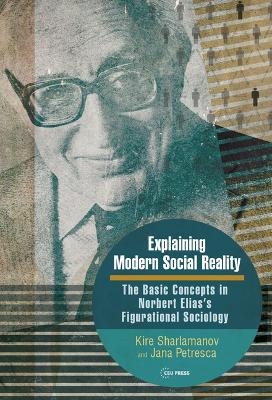
Explaining Modern Social Reality
Central European University Press (Verlag)
978-963-386-661-0 (ISBN)
- Noch nicht erschienen (ca. Januar 2025)
- Versandkostenfrei
- Auch auf Rechnung
- Artikel merken
Elias was an innovator. He criticized accepted concepts and introduced numerous new constructs (habitus is perhaps the best known) discussed in this book. Respective chapters review Elias’s theory of knowledge, the concept of de-civilization—with an emphasis on violence, his analysis of nations and nationalism, and emotions—and his focus on shame.
Elias borrowed ideas from iconic figures in philosophy and the social sciences such as Edmund Husserl, Karl Mannheim, Max Weber, Sigmund Freud, and Talcott Parsons. This book describes the characteristic way Elias interprets them. The book concludes with an overview of the most significant critiques of Norbert Elias's work.
Kire Sharlalamov is a full professor of Sociology at the International Balkan University. He is the author of several books in the field of Sociology, including "Populism and Meta Ideology" published in 2022. Currently Prof. Sharlamanov is the editor of Sociological Review, published by the Association of Sociologists of Macedonia and the Institute of Sociology and Law and Politics, published by the Faculty of Philosophy at the International Balkan University. Jana Petreska has a master's degree in clinical psychology with work experience at the International Balkan University. She currently works at Psyent.
PART 1. Norbert Elias: Biography, Characteristics and Influence
1.1. Life Path
1.2. The place of Norbert Elias in sociology
1.3. Theory of Knowledge
1.4.1. The influence of Hegel
1.4.2. The influence of Edmund Husserl
1.4.3. The influence of Karl Mannheim
1.4.4. The influence of Max Weber
1.4.5. The Influence of Karl Marx
1.4.6. The Influence of Émile Durkheim
1.4.7. The influence of Sigmund Freud
1.5. Figurational sociology
1.5.1. Figurational sociology and the relationship to Talcott Parsons
1.5.2. Basic characteristics of figurational sociology
1.5.3. Figurational sociology and interdependence of individuals
1.5.4. Figurations and processes
1.6. Evolutionism
1.7. The process of individualization
1.8. Value neutrality
PART 2. Sociogenesis of Society
2.1. Reflections of the book "The Civilization process"
2.1.1. Civilization as a concept
2.1.2. Controversies of the civilization as a concept
2.1.3. Civilization or culture
2.1.4. The process of civilization and social stratification
2.1.4.1. The evolution of class structure in Elias' opus
2.1.5. The process of civilization and the behavior of individuals
2.2. Survival units
2.2.1. Civilization and the state
2.2.2. National states and nations
2.2.3. Nations and nationalism
2.3. The civilizing process and political history of Europe
2.3.1. The civilizing process and the European Union
2.3.2. The evolutionary path of the EU
2.3.3. European identity and Elias
2.4. De-civilization process
2.4.1. Social preconditions for the de-civilization of Germany
2.4.2. National - socialism and de-civilization
2.4.3. De-civilization and the Holocaust
2.5. Violence
2.5.1. The role of the state in regulating violence
2.5.2. The conceptualization of the power of Norbert Elias
2.5.3. Violence and wars
2.5.4. Violence and global interdependences
PART 3. Psychogenesis of the Social Behaviour
3.1. The structure of the personality in the work of Norbert Elias
3.1.1. The concept of habitus in the work of Elias
3.2. In and Out Groups
3.3. The concept of involvement, distance and detachment in Elias' work
3.4. The importance of emotions in Elias' sociology
3.4.1. Emotions and manners of behavior
3.4.2. The role of shame in the civilizing process
3.4.2.1. Тhe social aspects of shame
3.4.2.2. The evolutionary development of shame
3.4.2.3. How shame has become invisible in modern society
3.4.3. The difference between shame and humiliation
3.4.3.1. The role of the feeling of humiliation in the process of civilization
3.4.3.2. The concept of humiliation in the Elias’s work
3.5. Informalization
3.5.1. Civilization and sexuality
3.5.2. The relationship between the sexes in the Elias’s work
3.5.3. Transformation of the attitude towards the body
(Civilization of the body)
3.6. Critical review of the work of Norbert Elias
Bibliography
Glossary of Terms
| Erscheint lt. Verlag | 31.1.2025 |
|---|---|
| Verlagsort | Budapest |
| Sprache | englisch |
| Maße | 152 x 229 mm |
| Themenwelt | Geschichte ► Teilgebiete der Geschichte ► Kulturgeschichte |
| Geschichte ► Teilgebiete der Geschichte ► Sozialgeschichte | |
| Sozialwissenschaften ► Soziologie ► Allgemeines / Lexika | |
| Sozialwissenschaften ► Soziologie ► Makrosoziologie | |
| ISBN-10 | 963-386-661-8 / 9633866618 |
| ISBN-13 | 978-963-386-661-0 / 9789633866610 |
| Zustand | Neuware |
| Haben Sie eine Frage zum Produkt? |
aus dem Bereich


